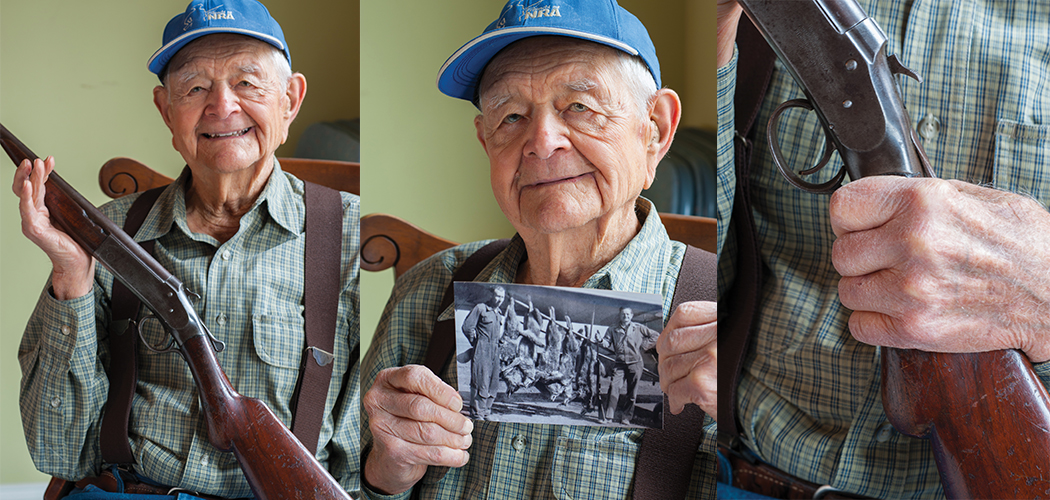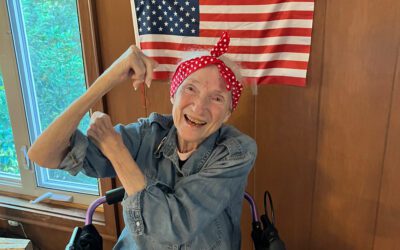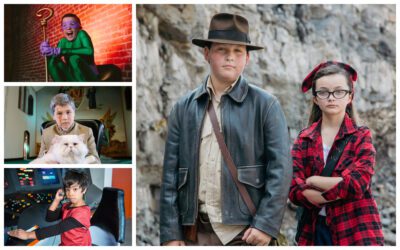[title subtitle=”words: Tonya McCoy
images courtesy: Steven Hunter”][/title]
A coyote moved in a swift slump across a field and into the crosshairs of Wayne Elmo Burd’s Winchester 70 rifle. Wayne’s gray eyes followed the intruder who passed close to his son’s horses in the pasture behind his house in Lavaca, Arkansas. He aimed from his spot on his front porch and it only took one shot to lower the creature to the frozen ground. For any hunter it would be quite a feat, but even more so for Wayne, who recently turned ninety-eight.
He talks about the coyote, and about the rest of his life, with amazing detail. “You won’t believe this. I shot my first dove when I was six years old. I’ve hunted ever since,” he laughs, and then holds up his 100-year-old Iver Johnson 410 shotgun that he used the day the coyote showed up.
“I had an old uncle who hunted, and he took me with him. Doves were lighting (landing to get a drink) on a pond bank. One lit, and he cocked the old shotgun and said, ‘Get him, Buzz,’ and I got him.”
He hit the dove on the first shot and has been a marksman ever since. In the 1950s, Wayne won clay target championships in Oklahoma, and was ranked eighth overall in the nation by the Amateur Trapshooting Association.
Wayne then set his sights on bigger targets. The massive head of a mounted elk towers over his living room. The beast was 486 pounds when he shot it in 1950 in Colorado. His son still has the horns of a 684 pound moose Wayne shot in Wyoming in 1954. He read in a magazine later that the biggest moose shot in Wyoming that year was less than an inch wider than his.
His travels took him from deer hunting in Arizona, to antelope hunting in Wyoming, to pheasant hunting in South Dakota. He was still pheasant hunting at the age of ninety-five. But the one thing Wayne’s wife, ninety-seven-year-old Dorothy Bell Burd won’t let him do anymore, is shoot coyotes from airplanes.
Wayne’s friend Joe owned the airport in Okmulgee, Oklahoma and Wayne would load up his rifle and Joe would prep his two-seat Piper Cub plane. Ranchers paid Wayne to thin out bands of coyotes. He’d lean his rifle out the window to shoot, and if he ran out of ammo for that, he’d use his pistol. Wayne had a couple of close calls, including two crashes. After the second crash, emergency crews had to cut Joe’s son, David, out of the airplane and he almost lost his leg.
“David didn’t know who he was for a day or two, but I didn’t get a scratch out of it,” explains Wayne. “I quit hunting coyotes, because my wife had a hissy fit. She said, ‘You can’t do that! I’m not going to have them come in here and tell me to come pick up your pieces.'”
So no more aerial hunts, but Wayne still loves to shoot and recently was recognized by the National Rifle Association. He received the award for the oldest living member at NRA conventions when he was ninety-five and ninety-six. He joined the NRA in 1938.
After his award in 2013, Wayne got a surprise. “I was sitting in front of the TV, looking at a book, and I happened to look up and realized, well heck, that’s me. There I was walking across the stage with Wayne Lapierre, who is the CEO of the NRA. I didn’t catch what they said; I didn’t have my hearing aids in. Anyway, I looked and they ran that thing till my face filled the whole screen up.” He says, smiling wide.
Wayne has albums filled with photos of hunting and fishing with family and friends. But he also remembers more somber times. Wayne was twelve years old, living in his hometown of Okmulgee, when the stock market crashed in 1929, crippling the economy and bringing on the Great Depression.
Wayne’s parents ran what he calls a little hamburger joint, “When it really got rough, we had a lot of people come in and say, ‘Hey, can I mop the floor to get something to eat?’… They never turned anybody away that came in there hungry.
When Wayne graduated high school jobs were scarce, so he moved to California. It was tough finding work, but he finally found a steady job at a Currie’s Ice Cream Store as a cone roller. He’d bake the cones right in the store and the sweet smell would bring in customers.
There were four waffle irons set in a row, and you rolled a cone around a little piece of aluminum cylinder cone shape, jerked it out and rolled another one. Anyway, it was quite a trick to get good at it, but I got good after a little while because the pay was based on how many cones you rolled.”
Before long he was appointed manager over two stores. However, he didn’t make much money, so when he was offered a job at a Union Oil Service Station, he took it. “Pumping gasoline, I made more than managing two ice cream stores. Oh yeah, I got up to $125 dollars a month… Anyway, I worked there for about a year and found myself a Union Oil Service Station manager.
That’s when his future wife Dorothy caught his eye. “She went to work at the restaurant right across from the service station. I never did like to drink coffee, but I discovered her over there. She was working til ten thirty at night and I was working til twelve, and I found out I needed a cup of coffee in the evening.
“She’d stand there and look across at the service station and send people with coffee cups over and I’d stand there and look across to the restaurant.”
Wayne married Dorothy during a trip to Las Vegas in March of 1941, months before the bombing of Pearl Harbor. A few years later, a draft letter arrived for Wayne. He prepared to move his wife and two-year-old son back to Okmulgee while he was away in the military. He quit his job and sold his belongings including most of his guns.
When Wayne arrived at the California draft office a lady informed him that they’d sent a second letter to let him know it had been decided that he wasn’t going because he was twenty- six and had a family. Unfortunately Wayne hadn’t received that second letter. With no job, Wayne worried about what he’d do next. He went to Union Oil to see if he could get another service station manager position; there were non available. Instead, they gave him a job driving a gasoline truck. After the war Wayne moved back to Okmulgee.
After a few temporary jobs, he started working in construction, but things changed when one day the office manager became ill. “The boss said, ‘Boy how are we gonna get these people paid?’ He was stomping the floor and chewing a big cigar. I said, ‘Well, you want me to go pay ’em?’ He said, ‘Can you make a payroll?’ I said, ‘Yeah made one for two years paying ice cream girls in California.’” A few weeks later a truck driver quit, and Wayne filled in, using his experience from Union Oil.
As the years passed Wayne became office manager for different construction jobs and his work was so well revered that after he’d retired, people were still calling him with job offers at the age of seventy-two.
Now over twenty-five years later, he lives with Dorothy in Lavaca and everyone calls Wayne “Papa Burd.” He walks around with a cane he’s supposed to use but doesn’t. He has four grandchildren and eight great-grandchildren.
He’s seen almost a century of life. He has hunting stories, work stories, and even a beautiful love story. Ask him the secret to a long happy life and he and his wife will laugh together, as if it’s an inside joke, and then he’ll say “Beans and Cornbread,” as if it makes all the sense in the world. And to the two of them, it certainly does.




